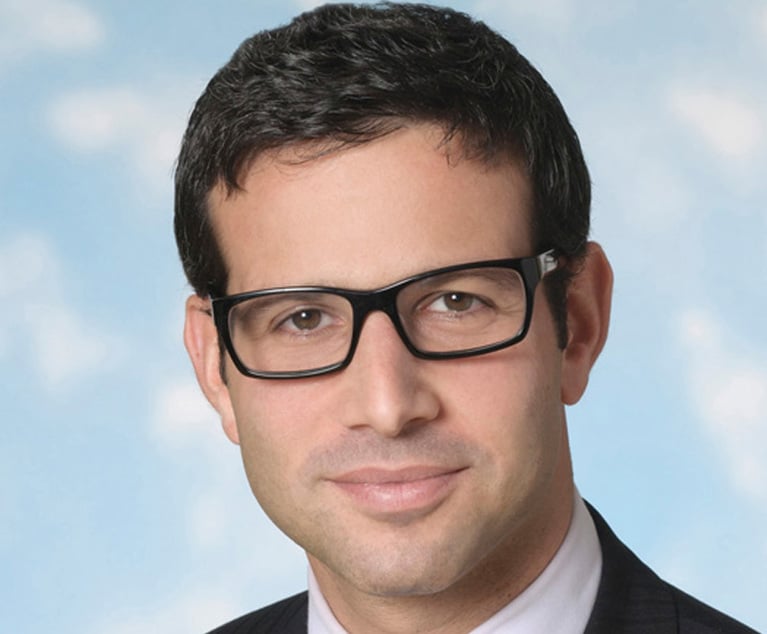On the Rise 2018: Katie L. Coleman
Katie L. Coleman, partner, Thompson & Knight
August 31, 2018 at 06:00 AM
6 minute read
 Katie Coleman, with Thompson & Knight.
Katie Coleman, with Thompson & Knight.
Katie L. Coleman, partner, Thompson & Knight
Experience:
- Thompson & Knight, 2014-present
- Andrews Kurth, 2007-2014
Education:
- University of Texas School of Law, 2007
- University of Texas at Austin, 2004
What drew you to a career in law?
If I am being honest, throughout most of college I was a liberal arts major without a defined career path. I thought I might be a writer or a professor. I took the LSAT just to keep my options open, but I did pretty well so I decided to apply for law school. I really had no idea what I was getting into, but today I am so glad I became a lawyer and I love my practice. I feel lucky that being a lawyer was ultimately a good fit for me.
Have you set a specific goal that you want to achieve in the next year?
This is my first year as Practice Leader for the Government and Regulatory group, so I am focusing on expanding our practice to include new areas and clients. I think it is important to be a holistic “counselor” for companies we represent, rather than working on isolated matters in a particular niche. When you represent clients on diverse matters, you really get to know their business and can develop trust, which improves the quality of the representation across the board. In the next year, my goal is to continue to build more of those relationships.
What has been your proudest career moment and your biggest hurdle?
Proudest career moment: I was involved in a protracted fight over Texas' competitive electric market design from 2011-2014. It was a high-stakes issue for my core client base, and it caused a lot of professional and personal stress. There was no clear path to resolution for several years, but our position ultimately prevailed. I learned a lot about perseverance during that experience. I am proudest of seeing that through to the end.
Biggest hurdle:
As an energy regulatory attorney, I have to interface regularly with economists, engineers, legislators, and the financial community. Gaining the experience and knowledge to analyze technical energy issues and think on my feet was tough, and took many years. I am still learning new things about the energy industry every day.
Where do you fit on a 1-10 work-life balance scale with 10 being nirvana? Please explain.
It's hard to draw a bright line between “work” and “life,” but I will go with “7.” Being an effective lawyer requires a major time commitment. The policy aspect of my energy practice also has a significant networking component. Because of this, co-workers, clients, and colleagues have become personal friends, and I enjoy talking with them about both work and non-work matters.
As I have become more senior, it has been easier to anticipate workflow and plan vacations where I can unplug for a few days. I play tennis regularly, read a lot of non- fiction books, and play the piano. I have also been taking violin lessons for about a year, but progress has been … slow.
What is the top quality that you've used to succeed in the profession?
Treating clients, colleagues, and judges as real people. At the end of the day, most decision-makers just want an answer that makes logical and intuitive sense. Clients want you to help solve their problems and make their lives easier. Getting bogged down in procedure and legalese can make you lose sight of the ultimate goal and the best way to achieve it. I try to be practical, know my audience, and focus on results rather than technicalities or academic thought exercises.
Who is your favorite mentor and why?
The partner who hired me, Phillip Oldham. He has been a great mentor in many respects, but what I value most is that he never assumes his way is the “right” way or the “only” way. Even as a young associate, he always took my opinions and analysis seriously and encouraged me to be an independent thinker. While I don't always “win,” he always listens and considers what I am saying. I think clients really benefit from that type of collaboration.
What's the best advice anyone has ever given you?
My law school writing professor, Wayne Schiess, told me that in writing and advocacy I should “show, don't tell.” I have gotten a lot of good advice over the years, but I go back to that piece of wisdom the most. Giving someone the information they need and guiding them toward the conclusion you want them to reach is always more effective than trying to tell them what to decide.
What trends are you observing in the profession that you're excited about?
I am seeing more women in leadership roles and in the top ranks at big law firms. When I started practicing 10 years ago, firms were focusing on gender equality (and diversity in general) during the hiring process. As lawyers climbed the ranks, however, very few women were making it into the upper levels of compensation or firm leadership. When I moved to Thompson & Knight in 2014, the managing partner was a woman, and there are a growing number of female management committee members and practice group leaders today (including me!). There has been rapid change in this area over the past few years, and I hope that continues.
What is the greatest challenge you see for the legal profession?
Navigating conflicts as firms get larger and larger, particularly through consolidations. In recent years, many smaller and mid-sized Texas firms have disbanded or consolidated with much larger firms. This seems to be a growing national trend as well. The more business that is consolidated into a larger firm, the harder it is to bring in new matters without getting mired in conflict resolution.
This content has been archived. It is available through our partners, LexisNexis® and Bloomberg Law.
To view this content, please continue to their sites.
Not a Lexis Subscriber?
Subscribe Now
Not a Bloomberg Law Subscriber?
Subscribe Now
NOT FOR REPRINT
© 2025 ALM Global, LLC, All Rights Reserved. Request academic re-use from www.copyright.com. All other uses, submit a request to [email protected]. For more information visit Asset & Logo Licensing.
You Might Like
View All
Kirkland's Daniel Lavon-Krein: Staying Ahead of Private Equity Consolidation

Vinson & Elkins: Traditional Energy Practice Meets Energy Transition
4 minute read
Advising 'Capital-Intensive Spaces' Fuels Corporate Practice Growth For Haynes and Boone
4 minute read
Get to Know Texas Lawyer's Attorney of the Year Finalists
Trending Stories
- 1How Alzheimer’s and Other Cognitive Diseases Affect Guardianship, POAs and Estate Planning
- 2How Lower Courts Are Interpreting Justices' Decision in 'Muldrow v. City of St. Louis'
- 3Phantom Income/Retained Earnings and the Potential for Inflated Support
- 4Should a Financially Dependent Child Who Rejects One Parent Still Be Emancipated?
- 5Advising Clients on Special Needs Trusts
Who Got The Work
J. Brugh Lower of Gibbons has entered an appearance for industrial equipment supplier Devco Corporation in a pending trademark infringement lawsuit. The suit, accusing the defendant of selling knock-off Graco products, was filed Dec. 18 in New Jersey District Court by Rivkin Radler on behalf of Graco Inc. and Graco Minnesota. The case, assigned to U.S. District Judge Zahid N. Quraishi, is 3:24-cv-11294, Graco Inc. et al v. Devco Corporation.
Who Got The Work
Rebecca Maller-Stein and Kent A. Yalowitz of Arnold & Porter Kaye Scholer have entered their appearances for Hanaco Venture Capital and its executives, Lior Prosor and David Frankel, in a pending securities lawsuit. The action, filed on Dec. 24 in New York Southern District Court by Zell, Aron & Co. on behalf of Goldeneye Advisors, accuses the defendants of negligently and fraudulently managing the plaintiff's $1 million investment. The case, assigned to U.S. District Judge Vernon S. Broderick, is 1:24-cv-09918, Goldeneye Advisors, LLC v. Hanaco Venture Capital, Ltd. et al.
Who Got The Work
Attorneys from A&O Shearman has stepped in as defense counsel for Toronto-Dominion Bank and other defendants in a pending securities class action. The suit, filed Dec. 11 in New York Southern District Court by Bleichmar Fonti & Auld, accuses the defendants of concealing the bank's 'pervasive' deficiencies in regards to its compliance with the Bank Secrecy Act and the quality of its anti-money laundering controls. The case, assigned to U.S. District Judge Arun Subramanian, is 1:24-cv-09445, Gonzalez v. The Toronto-Dominion Bank et al.
Who Got The Work
Crown Castle International, a Pennsylvania company providing shared communications infrastructure, has turned to Luke D. Wolf of Gordon Rees Scully Mansukhani to fend off a pending breach-of-contract lawsuit. The court action, filed Nov. 25 in Michigan Eastern District Court by Hooper Hathaway PC on behalf of The Town Residences LLC, accuses Crown Castle of failing to transfer approximately $30,000 in utility payments from T-Mobile in breach of a roof-top lease and assignment agreement. The case, assigned to U.S. District Judge Susan K. Declercq, is 2:24-cv-13131, The Town Residences LLC v. T-Mobile US, Inc. et al.
Who Got The Work
Wilfred P. Coronato and Daniel M. Schwartz of McCarter & English have stepped in as defense counsel to Electrolux Home Products Inc. in a pending product liability lawsuit. The court action, filed Nov. 26 in New York Eastern District Court by Poulos Lopiccolo PC and Nagel Rice LLP on behalf of David Stern, alleges that the defendant's refrigerators’ drawers and shelving repeatedly break and fall apart within months after purchase. The case, assigned to U.S. District Judge Joan M. Azrack, is 2:24-cv-08204, Stern v. Electrolux Home Products, Inc.
Featured Firms
Law Offices of Gary Martin Hays & Associates, P.C.
(470) 294-1674
Law Offices of Mark E. Salomone
(857) 444-6468
Smith & Hassler
(713) 739-1250






